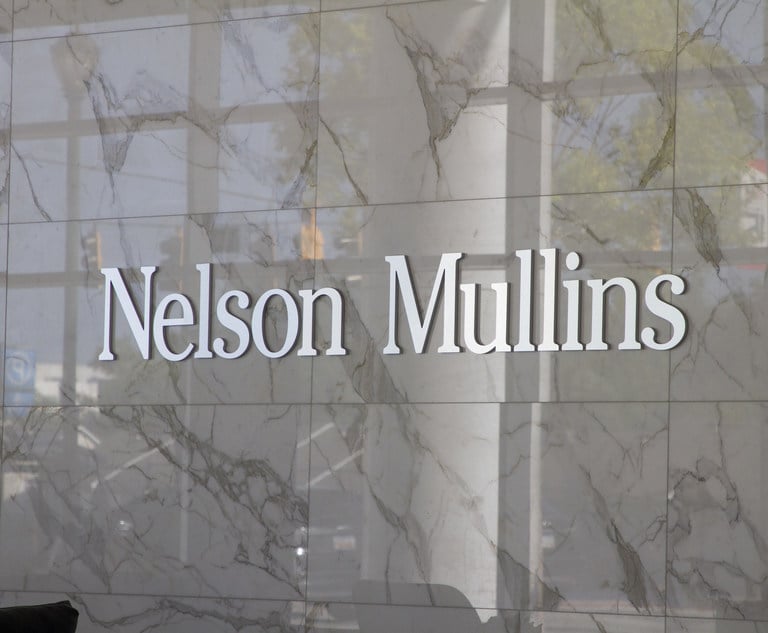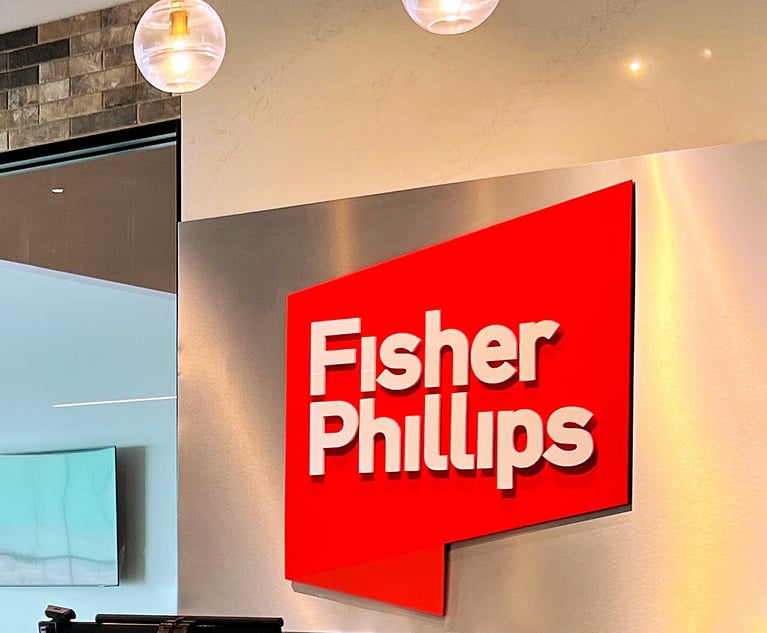 Shari Klevens and Alanna Clair, Dentons.
Shari Klevens and Alanna Clair, Dentons.Important Things to Know About the ABA's Changes to Attorney Advertising Rules
Although the attorney advertising rules are meant to protect the public, it is possible that attorneys were using these rules defensively against other members of the bar.
September 10, 2018 at 11:35 AM
6 minute read
The practice of law is a business. As one aspect of that business, many lawyers and firms engage in marketing or advertising to increase their market share or to attract new customers. However, the ethical rules governing advertising can be strict as well as sometimes difficult to understand in the age of social media.
The ABA recently approved changes to Model Rules 7.1 through 7.5, which govern attorney advertising. These changes are expected to address concerns regarding the public's access to justice and attorneys' ability to make a living. Each state sets the rules for their attorneys regarding whether and to what extent attorneys are permitted to advertise. Although each state will have to determine whether or to what extent to adopt these model rules, the changes may highlight the direction the legal field may be expected to evolve.
Why Make Changes?
The rules against attorney advertising can be strict and comprise a great number of bar complaints against attorneys. However, data have indicated that bar complaints regarding an attorney's improper advertising were often coming from other lawyers complaining about their competitors and not from affected clients or potential clients. This suggests that, although the attorney advertising rules are meant to protect the public, it is possible that attorneys were using these rules defensively against other members of the bar.
The ABA has noted that, if the rules on advertising are too limiting, the result can hurt both the public and attorneys who practice. Indeed, if attorneys fail to advertise their services because the rules are drawn too narrowly (or because attorneys are concerned about violating those rules), the bar may be depriving the public the ability to find available legal services. If attorneys are unable to reach potential clients, those potential clients could even go without legal representation, which is a disadvantage to the overall community.
Further, if an attorney is too hamstrung to advertise her or his legal services without running afoul of the bar rules, it could adversely impact that attorney's efforts to find new clients. Particularly for attorneys who are newer to the bar, the inability to advertise for new clients could be devastating.
These issues weighed in favor of the amendments to the Model Rules.
Avoid Misleading Statements
It is axiomatic that attorneys are not supposed to make misleading statements. The Model Rules, as revised, reinforce that attorneys may not make misleading statements about their firms, including in their letterheads.
The ABA has recommended deleting Model Rule 7.5, which governed a law firm's use of firm names and letterheads, noting that a lawyer could not adopt a misleading firm name or professional designation. In an apparent effort to streamline the rules—and get to the heart of why certain restrictions exist—the ABA has proposed relegating the contents of former Rule 7.5 to a comment to Rule 7.1 (which is the rule prohibiting false or misleading statements).
Comment 5 to Model Rule 7.1 now provides that “Firm names, letterhead and professional designations are communications concerning a lawyer's services.” The comment goes on to clarify what could make a firm name “misleading” under Model Rule 7.1, such as an implied connection with a government agency, with a lawyer not associated with the firm (or a predecessor firm), or with a public or charitable legal services organization.
Thus, the ABA has suggested that firm names do not require their own separate rule to govern their propriety, but that naming should be part of the overall requirement of attorneys under Model Rule 7.1 not to mislead the public.
What is “Advertising?”
Model Rule 7.2 used to state that, subject to the requirements on honesty, a “[l]awyer may advertise information regarding the lawyer's services.” For some attorneys and firms, the definition of “advertising” proved a sticking point. Was a social media post about a victory in court an “advertisement?” What about an article describing an attorney's experience with a specific legal issue?
The ABA addressed those concerns by amending the word “advertise” to “communicate” in Model Rule 7.2: “A lawyer may communicate information regarding the lawyer's services through any media…” Thus, the rule appears to permit any form of communication—subject to the requirement that it not be misleading—without necessarily having to review whether the communication is an advertisement.
The amendments additionally suggest that solicitations may not have to be marked as “advertising material.” However, a disclaimer may still be necessary if the communication suggests that the results discussed could be obtained for other clients. Disclaimers may also be helpful for other purposes in such communications.
The rules on advertising are not always intuitive. Thus, it is always helpful for attorneys to check their local rules before acting.
Certain Types of Solicitation Permitted
Similarly, many attorneys and bars adopted something of a “know it when you see it” approach to attorney solicitations. There are strict rules in many jurisdictions regarding when and under what circumstances an attorney may “solicit” a potential client.
Now, part (a) of Model Rule 7.3 has been amended to actually define solicitation: “'Solicitation' or 'solicit' denotes a communication initiated by or on behalf of a lawyer or law firm that is directed to a specific person the lawyer knows or reasonably should know needs legal services in a particular matter and that offers to provide, or reasonably can be understood as offering to provide, legal services for that matter.”
The revised rules also appear to permit in-person solicitation of sophisticated clients. Indeed, although a lawyer is generally not permitted to solicit professional employment in person, amended Model Rule 7.3 permits such contact directly to lawyers, to those who have a relationship with the lawyer, or to a person “who routinely uses for business purposes the type of legal services offered by the lawyer.” Although attorneys still may not use coercion or harassment and may not solicit those who have made it clear they do not want to be solicited, these changes recognize that not all attorneys who want to make direct contact with a specific potential client are so-called “ambulance chasers.” Indeed, the ABA suggests that sophisticated clients may be in the best position to determine whether a contact should continue.
Shari L. Klevens is a partner at Dentons US in Atlanta and Washington and serves on the firm's U.S. board of directors. She represents and advises lawyers and insurers on complex claims and is co-chair of Dentons' global insurance sector team.
Alanna Clair is a partner at Dentons US in Washington and focuses on professional liability and insurance defense. Shari and Alanna are co-authors of “The Lawyer's Handbook: Ethics Compliance and Claim Avoidance” and the upcoming 2019 edition of “Georgia Legal Malpractice Law.”
This content has been archived. It is available through our partners, LexisNexis® and Bloomberg Law.
To view this content, please continue to their sites.
Not a Lexis Subscriber?
Subscribe Now
Not a Bloomberg Law Subscriber?
Subscribe Now
NOT FOR REPRINT
© 2024 ALM Global, LLC, All Rights Reserved. Request academic re-use from www.copyright.com. All other uses, submit a request to [email protected]. For more information visit Asset & Logo Licensing.
You Might Like
View All
On the Move: Hunton Andrews Kurth Practice Leader Named Charlotte Managing Partner
6 minute read
Husch Blackwell, Foley Among Law Firms Opening Southeast Offices This Year
9 minute read

Trending Stories
- 1Call for Nominations: Elite Trial Lawyers 2025
- 2Senate Judiciary Dems Release Report on Supreme Court Ethics
- 3Senate Confirms Last 2 of Biden's California Judicial Nominees
- 4Morrison & Foerster Doles Out Year-End and Special Bonuses, Raises Base Compensation for Associates
- 5Tom Girardi to Surrender to Federal Authorities on Jan. 7
Who Got The Work
Michael G. Bongiorno, Andrew Scott Dulberg and Elizabeth E. Driscoll from Wilmer Cutler Pickering Hale and Dorr have stepped in to represent Symbotic Inc., an A.I.-enabled technology platform that focuses on increasing supply chain efficiency, and other defendants in a pending shareholder derivative lawsuit. The case, filed Oct. 2 in Massachusetts District Court by the Brown Law Firm on behalf of Stephen Austen, accuses certain officers and directors of misleading investors in regard to Symbotic's potential for margin growth by failing to disclose that the company was not equipped to timely deploy its systems or manage expenses through project delays. The case, assigned to U.S. District Judge Nathaniel M. Gorton, is 1:24-cv-12522, Austen v. Cohen et al.
Who Got The Work
Edmund Polubinski and Marie Killmond of Davis Polk & Wardwell have entered appearances for data platform software development company MongoDB and other defendants in a pending shareholder derivative lawsuit. The action, filed Oct. 7 in New York Southern District Court by the Brown Law Firm, accuses the company's directors and/or officers of falsely expressing confidence in the company’s restructuring of its sales incentive plan and downplaying the severity of decreases in its upfront commitments. The case is 1:24-cv-07594, Roy v. Ittycheria et al.
Who Got The Work
Amy O. Bruchs and Kurt F. Ellison of Michael Best & Friedrich have entered appearances for Epic Systems Corp. in a pending employment discrimination lawsuit. The suit was filed Sept. 7 in Wisconsin Western District Court by Levine Eisberner LLC and Siri & Glimstad on behalf of a project manager who claims that he was wrongfully terminated after applying for a religious exemption to the defendant's COVID-19 vaccine mandate. The case, assigned to U.S. Magistrate Judge Anita Marie Boor, is 3:24-cv-00630, Secker, Nathan v. Epic Systems Corporation.
Who Got The Work
David X. Sullivan, Thomas J. Finn and Gregory A. Hall from McCarter & English have entered appearances for Sunrun Installation Services in a pending civil rights lawsuit. The complaint was filed Sept. 4 in Connecticut District Court by attorney Robert M. Berke on behalf of former employee George Edward Steins, who was arrested and charged with employing an unregistered home improvement salesperson. The complaint alleges that had Sunrun informed the Connecticut Department of Consumer Protection that the plaintiff's employment had ended in 2017 and that he no longer held Sunrun's home improvement contractor license, he would not have been hit with charges, which were dismissed in May 2024. The case, assigned to U.S. District Judge Jeffrey A. Meyer, is 3:24-cv-01423, Steins v. Sunrun, Inc. et al.
Who Got The Work
Greenberg Traurig shareholder Joshua L. Raskin has entered an appearance for boohoo.com UK Ltd. in a pending patent infringement lawsuit. The suit, filed Sept. 3 in Texas Eastern District Court by Rozier Hardt McDonough on behalf of Alto Dynamics, asserts five patents related to an online shopping platform. The case, assigned to U.S. District Judge Rodney Gilstrap, is 2:24-cv-00719, Alto Dynamics, LLC v. boohoo.com UK Limited.
Featured Firms
Law Offices of Gary Martin Hays & Associates, P.C.
(470) 294-1674
Law Offices of Mark E. Salomone
(857) 444-6468
Smith & Hassler
(713) 739-1250






